In this week’s review of Court Judgments, we look at the Supreme Court’s observation mere acceptance of the rent by the landlord after the expiry of the period of a lease would not amount to a waiver of the termination of the lease, that SC has the inherent powers and discretion to cancel the bail of an accused even in the absence of supervening circumstances, Karnataka HC’s observation that Seniority need not be a criterion for ad hoc appointment, and that chain of cogent circumstances and prosecution evidence is necessary for a conviction based on extra-judicial confession.
SC: Mere acceptance of the rent by the landlord after the expiry of the period of a lease would not amount to a waiver of the termination of the lease
The landlord, Erappa. G had filed a suit for eviction against the tenant, K M Manjunath who argued that there was no valid termination of tenancy in accordance with section 106 of the Transfer of Property Act, 1882. The Trial Court dismissed the eviction suit upholding the tenant’s argument. The matter was then taken to the Karnataka High Court which held that the lease would be determined by efflux of time under Section 111(a) of the Act, and not Section 106. In the absence of registered documents, the period of lease should have been 11 months was the contention of the legal representatives of the deceased property owner. The High Court directed the tenant to pay the arrears of rent at Rs.1,400 per month till possession of the property is handed over. It also asked the tenant to hand over the possession within 60 days.
Following this, the tenant filed a Special Leave Petition in the Supreme Court against the Judgment and final order passed by the Karnataka High Court. In K.M. Manjunath vs. Erappa. G (deceased). The Supreme Court Bench comprising Justices CT Ravikumar and Sudhanshu Dhulia upheld the High Court’s decision that mere acceptance of the rent by the landlord after the expiry of the period of the lease would not amount to a waiver of the termination of the lease. In simpler words, just because the landowner is paid rent even after the tenure of the contract of the lease ends, it does not mean that the tenure has not ended. It added that the judgment of the Civil Court was not ‘according to law’. The tenant was directed to continue payment of rent as stated by the High Court till they vacate the property within 6 months.
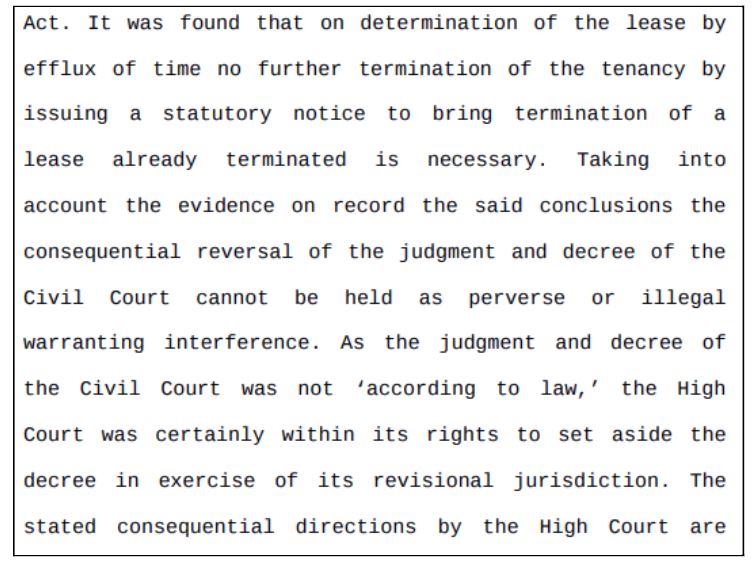
SC has the inherent powers and discretion to cancel the bail of an accused even in the absence of supervening circumstances
In Deepak Yadav vs. State of UP, the appellant approached the Supreme Court challenging the Allahabad High Court’s grant of bail to those accused of shooting and killing the appellant’s father. The High Court granted the bail considering past judgements, the nature of the offence, arguments advanced by the parties, evidence on record regarding the complicity of the accused, and Article 21 of the Constitution of India. It had also laid a set of conditions for the accused to adhere to, failure of which could lead to cancellation of bail.
However, the Supreme Court Bench of Chief Justice of India NV Ramana, and Justices Krishna Murari and Hima Kohli allowed the appeal and set the bail aside observing that the High Court had not taken into consideration the relevant facts and circumstances and evidence that prove that the accused was charged with a serious offence. The criminal history of the accused, his involvement, nature of crime, material evidence, and recovery of weapon from his possession were not considered by the High Court. The Supreme Court, in the judgement, discussed principles regarding the grant of bail, and cancellation of bail, referring to past judgements. It added that the Supreme Court had inherent powers and discretion to cancel the bail of an accused even in the absence of supervening circumstances. Some of the circumstances when the bail can be cancelled are:
- If irrelevant material of substantial nature is considered and the relevant material on record is ignored by the court granting bail.
- If the court granting bail overlooks the influential position of the accused as against the victim or the witnesses.
- If the past criminal record and conduct of the accused is completely ignored while granting bail.
- If the bail has been granted on untenable grounds.
- Where serious discrepancies are found in the order granting bail resulting in prejudice to justice.
- Where the grant of bail was not appropriate considering the very serious nature of the charges against the accused which does not entitle him to bail.
- If the order granting bail is apparently whimsical, capricious, and perverse in the facts of the given case.
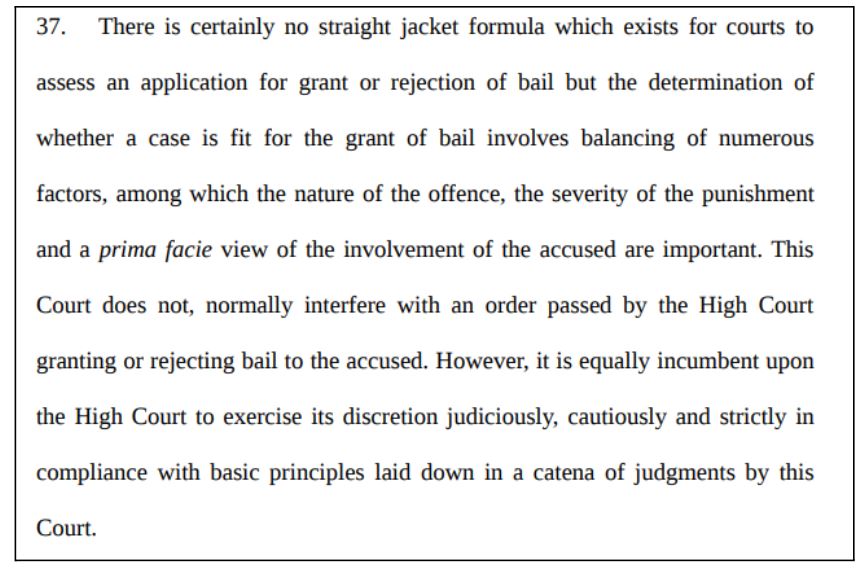
Karnataka HC: Seniority need not be a criterion for ad hoc appointment
In the University of Agricultural Sciences vs. Dr. Digambarappa, & Others, Dr. Digambarappa had initially filed a petition before the Karnataka High Court questioning his placement in the post of Dean and that of another respondent in the post of Director of Education despite the petitioner being the senior-most in the cadre of Professor. The petition was opposed by the university and the respondent stated that the appointment was temporary for a period of 6 months and was made on a rotational basis. Further, they contended that the petitioner was appointed as a director earlier and cannot have any grievance as he has been given the post of Dean, which is equivalent to that of Director. However, a single judge bench allowing the petition held that the petitioner is appointed to the post of Director considering his seniority.
Following this, the university and the other respondent appealed to the Court challenging the order. A bench comprising of Justices Krishna S Dixit and P Krishna Bhat allowed the appeal stating that seniority does not factor in the case of ad hoc appointment. Though seniority is an important factor for promotions, in the cases of ad hoc appointments, seniority takes a backseat since anyone can be chosen by the authority. The purpose of the rotation is that eligible aspirants for the posts are given an opportunity to take up the position which can help boost their careers. Moreover, talented teachers can be retained on the campus by providing such an opportunity.
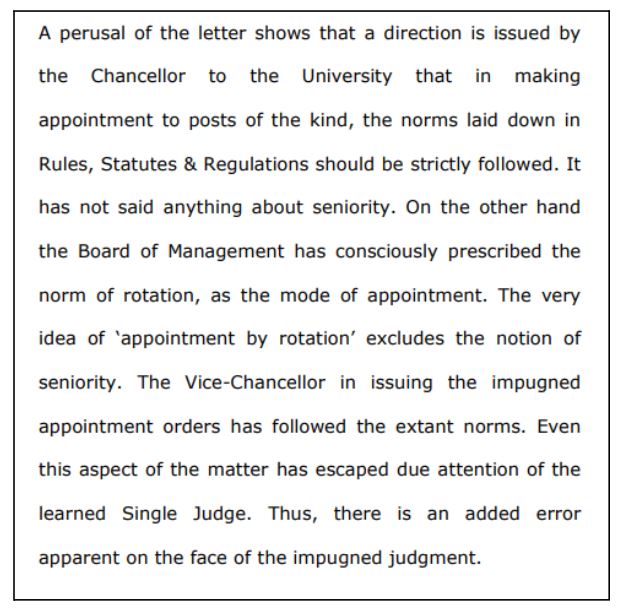
Madras HC: A chain of cogent circumstances and prosecution evidence is necessary for a conviction based on an extra-judicial confession
In Dinesh vs. the State, the appellant had allegedly murdered his schoolmate and buried the body near the compound wall of his residence when he declined to have homosexual intercourse with him and feared that he would reveal it to others. Later, he surrendered himself to the Village Administrative Officer, Devanampattinam and gave an extra-judicial confession that he had murdered his schoolmate. Evidence was also recovered from the scene of occurrence. On completion of the trial, the Trial Court sentenced him to life imprisonment with a fine of Rs.1000.
The appellant then approached the High Court. He argued that the entire prosecution case was based on vague circumstantial evidence and did not point to the guilt of the accused. Moreover, the motive was not properly established. The appellant further argued that there was not enough evidence to establish that the deceased was last seen with the appellant or that the premises belonged to him. They highlighted that a different angle of the investigation was not considered.
The High Court also observed that the entire case was based on circumstantial evidence and lacked material evidence or eyewitnesses. Calling the motive established and weapon of offence artificial and cock and bull story, the High Court Bench of Justice Paresh Upadhyay and Justice AD Jagdish Chandira observed that there were discrepancies and material contradictions in the investigation. The Bench stated that “an extra-judicial confession is a weak kind of evidence and unless it inspires confidence or is fully corroborated by some other evidence of clinching nature, ordinarily conviction for the offence of murder should not be made only on the evidence of extra-judicial confession”. In other words, a conviction cannot be based on extra-judicial confessions unless it is supported by convincing circumstances. On these grounds, the High Court acquitted the appellant of all charges.
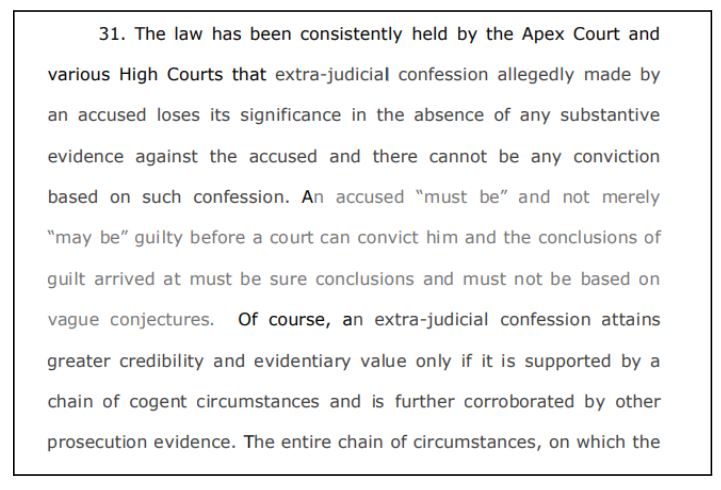
Telangana HC: Employer must be given reasonable opportunity to represent his case under Section 7-C of EPF Act
In M/s. The AGA Khan Academy vs. Assistant PF Commissioner, the petitioner filed a Writ Petition in the Telangana High Court following the orders passed by the Assistant Provident Fund Commissioner, Hyderabad, under Section 7C of the EPF Act, 1952. The Commissioner had determined an amount of Rs. 15,21,834 as a contribution in respect of an international worker. The petitioner presented before the Court that it was a not-for-profit charitable institution and that the employee concerned was hired as a consultant for a period of 8 months and then employed for three years.
The Assistant PF Commissioner initiated a 7-A enquiry for the period from April 2013 to June 2015 and passed an order in 2018 determining the contributions payable as Rs. 52,72,451 in respect of domestic and international workers. This was paid up by the petitioners. The employee filed another complaint that PF contributions were not paid from February 2015 to November 2019, following which proceedings under Section 7-A commenced and the Commissioner passed an order under 7-C of the Act which provided for the determination of escaped amount which escaped determination of the dues by the employer under 7-A.
Multiple issues were considered by the Court when hearing the case- whether the employee, being a foreigner is eligible for EPF? What was the period for which she was eligible? What were the wages for which the employer was liable to pay EPF dues in the case of the complainant? What was the quantum of EPF dues payable by the Foundation?
Justice G. Radha Rani observed that Section 7-C of the Act provides for giving a reasonable opportunity to the employer to represent his case before redetermining the amount due from them. However, in this case, no opportunity was provided to the petitioner for representing his case before the Commissioner issued proceedings under 7-C. Thus, the petition was allowed.
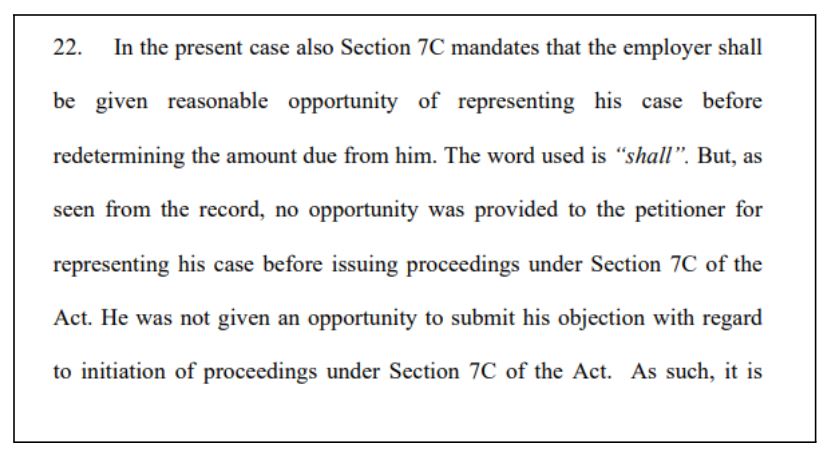
Featured Image: Important Court Judgements


